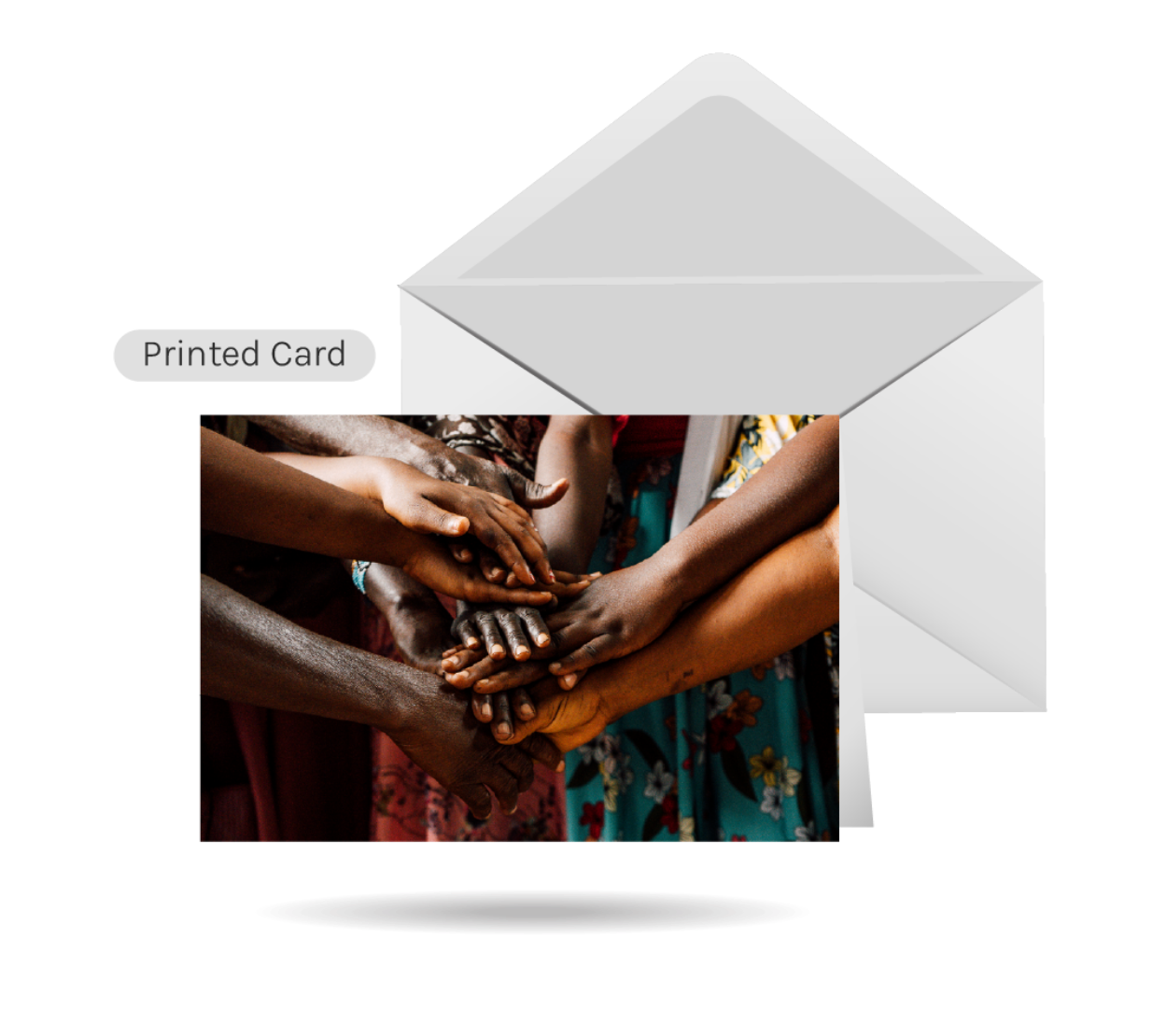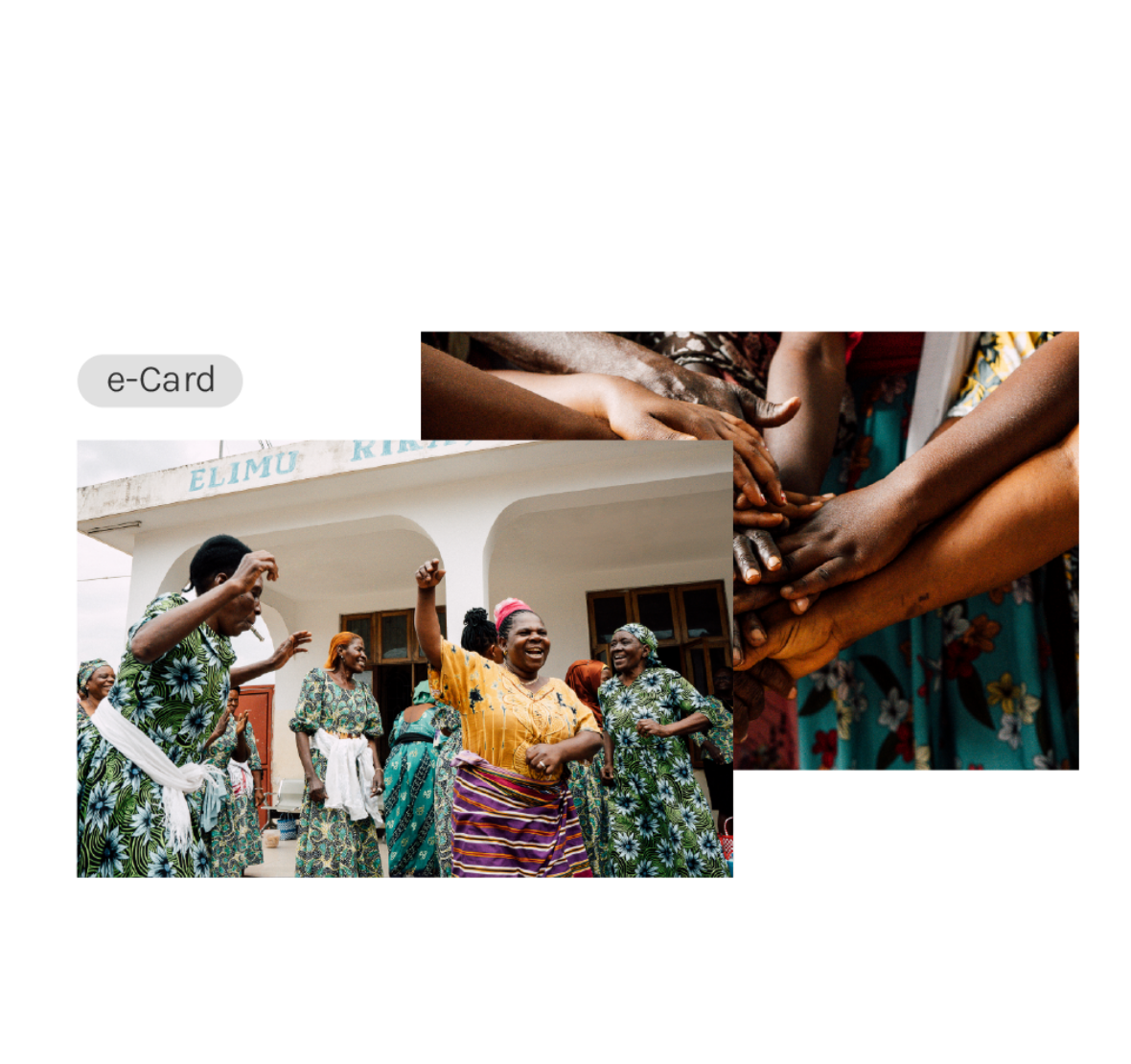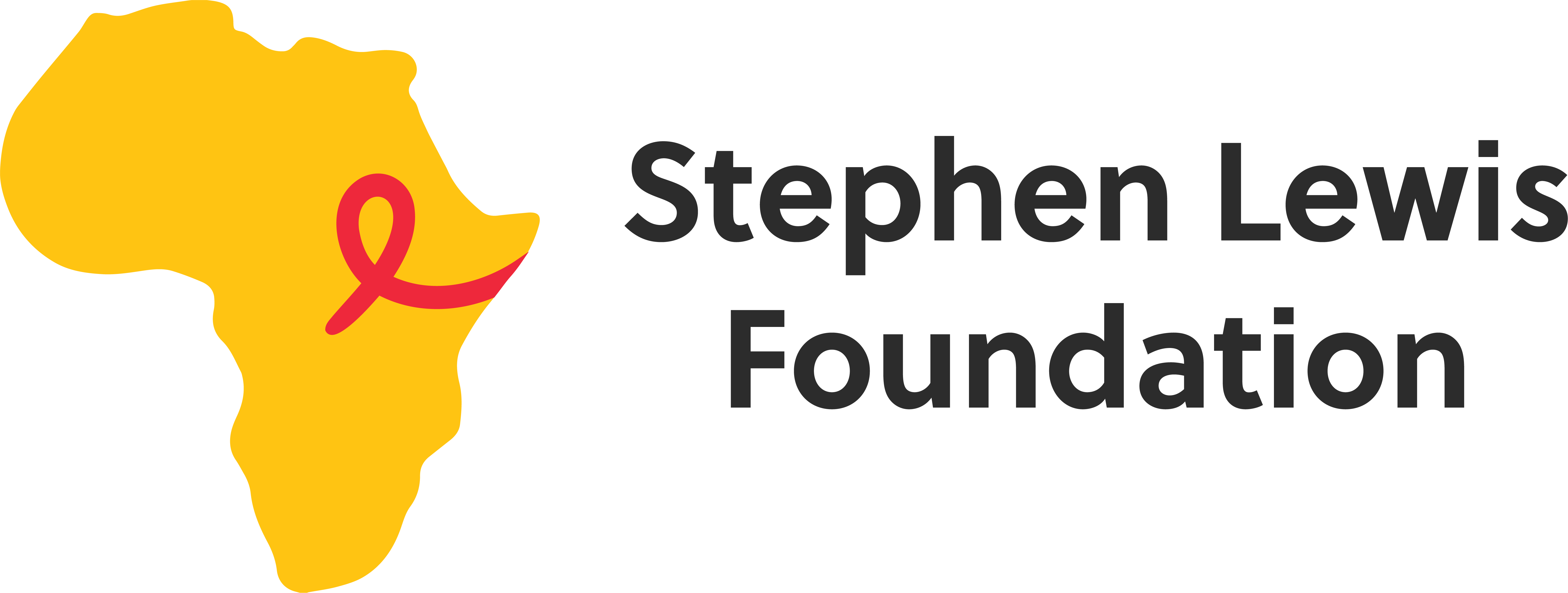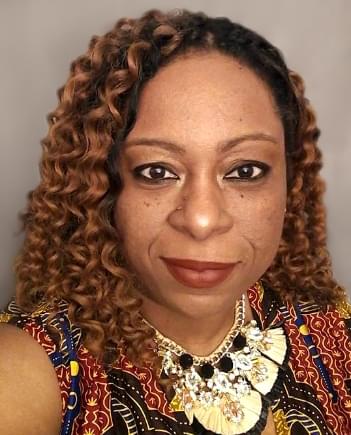Grassroots
FALL 2023
Photo Credit: Neema Ngelime
Location: Tanzania
The International Grandmothers Gathering across 11 countries, October 24–26
Twenty years ago, the AIDS pandemic was ravaging sub-Saharan Africa. The very survival of communities was under threat. Almost an entire generation was lost to AIDS-related illnesses, leaving millions of children without parents.
In the midst of this global health disaster, grandmothers courageously stepped forward to guide their grandchildren through their grief and toward a hopeful future, and the SLF’s Grandmothers to Grandmothers Campaign found its roots. Canadian grandmothers rallied, determined to raise funds and support for African women who were already doing so much.
In August 2006, on the eve of the 16th International AIDS Conference, the Stephen Lewis Foundation held a Toronto Grandmothers Gathering to launch the Grandmothers to Grandmothers Campaign. One hundred African and 200 Canadian grandmothers gathered for three historic days of workshops, facilitated by the grandmothers themselves.
They shared their personal journeys and about the grief and stigma they experienced. While raising their grandchildren, they were also striving for equality, autonomy, and to have their human rights respected and protected. Canadian grandmothers heard accounts from African grandmothers firsthand and recognized in them their roles as powerful community leaders.
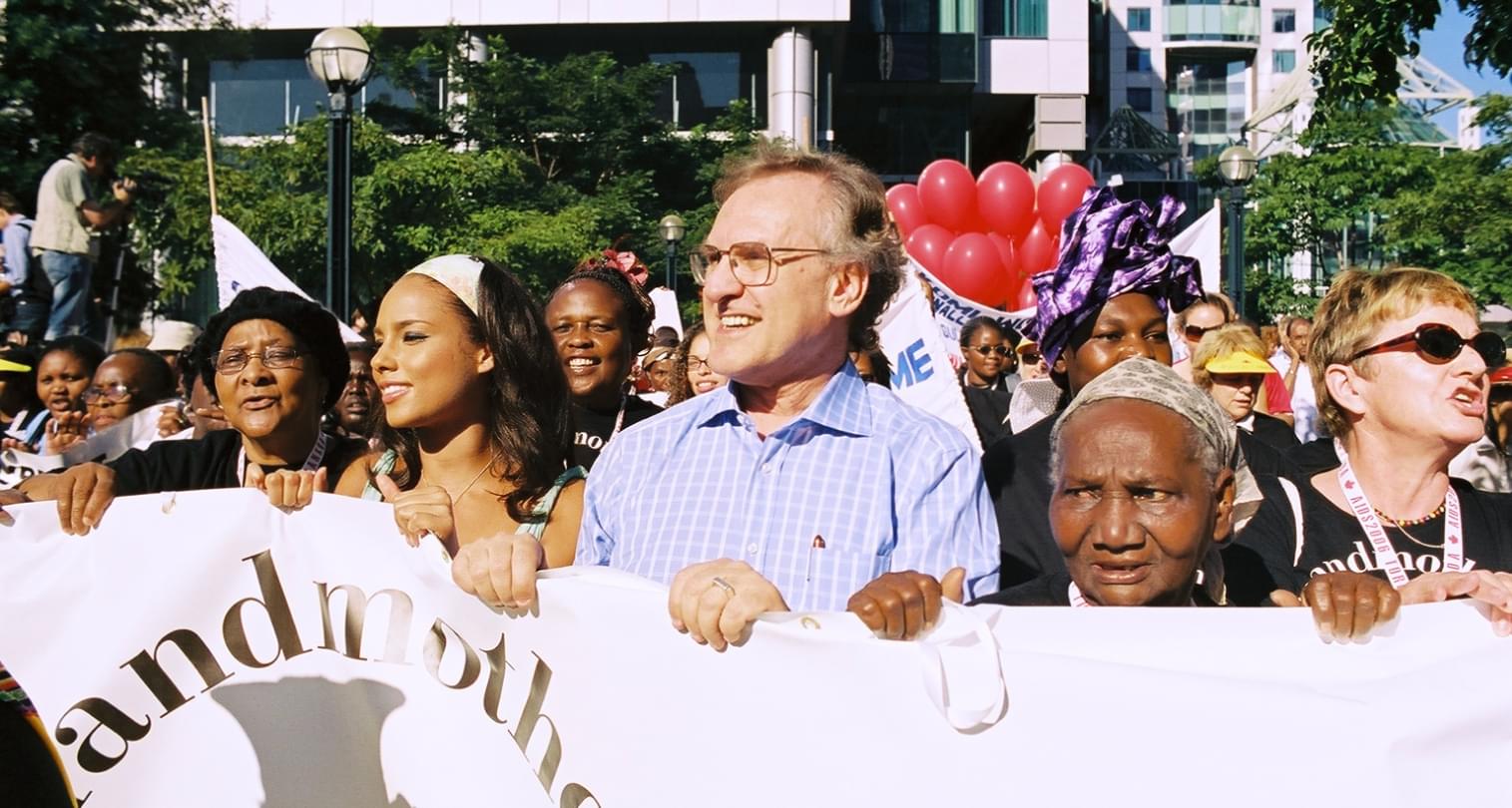
Photo Credit: Liz Marshall
Location: Canada
Grandmothers were joined by Stephen Lewis and Alicia Keys in a solidarity march through the streets of Toronto, Canada, in 2006.
On the final day of the gathering in 2006, grandmothers marched in the streets of Toronto and presented the Toronto Statement. It was a rallying cry and a symbol of solidarity rooted in the sentiment, “We will not rest, until they can rest.” Seventeen years later, Canadian grandmothers have not wavered on this commitment.
Now, as we celebrate the 20th anniversary of the Stephen Lewis Foundation, we are gathering grandmothers and community leaders for a hybrid International Grandmothers Gathering event taking place October 24–26, 2023, simultaneously in Canada, Ethiopia, Eswatini, Kenya, Malawi, Mozambique, South Africa, Tanzania, Uganda, Zambia, and Zimbabwe. In Canada, 150 grandmothers are gathering at the Canadian Museum for Human Rights in Winnipeg, with more connecting virtually.
Grandmothers in Canada are kicking off the gathering in Winnipeg in the same way they concluded the gathering in Toronto — with a powerful solidarity march. Grandmother activists in all 11 countries will share stories, build community, and mobilize to make an action plan for the next chapter of the international grandmothers movement under the theme: Reflect, Rejuvenate, Renew. Grandmothers rising to new possibilities.
In the first edition of the Grassroots newsletter in 2004, Stephen wrote, “The Foundation has no illusions: the pandemic is a force of mass destruction. But it’s a force that can be subdued by the strength of the human spirit.”
The international grandmothers movement has exemplified the best of the human spirit for almost two decades. Follow the SLF on social media for updates on #IGG2023 as grandmothers Reflect, Rejuvenate, and Renew!
For more about the gathering, visit:
theslf.org/IGG2023.
Likely the strongest and most compelling factor in our continuing is that we learn our efforts have positive results. We are grateful that in many and various ways the SLF keeps us informed of the grassroots projects, difficulties, and successes. We become aware that the resilient, determined, courageous African grandmothers have, with astounding effort, proven that our support has assisted in their accomplishments. With their strength and wisdom, they are standing up to governments demanding what they need not only for surviving but also for thriving. Each victory to conquer the damaging effects of the HIV and AIDS pandemic encourages us to continue in the movement.
— Burlington Ubuntu Grandwomen,
a Grandmothers to Grandmothers Campaign group
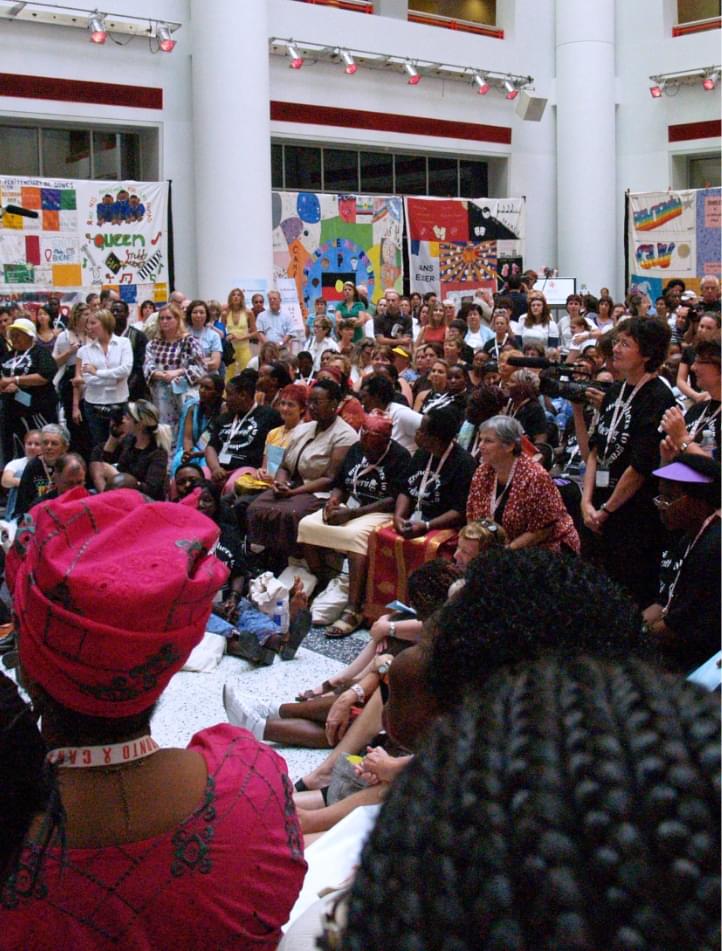
Photo Credit: SLF
At the first International Grandmothers Gathering in 2006 in Canada, grandmothers and their allies came together to raise awareness about the needs of older women affected by HIV and AIDS.
The power of solidarity
By Meg French, Executive Director, Stephen Lewis Foundation
This summer I had the privilege of spending time with some of the SLF’s LGBTIQ partners in Kenya. In the face of rising homophobia and transphobia, the stories they shared and the work I saw were humbling, moving, and inspiring.
In the middle of July, I flew to Nairobi, the first stop on a two-week visit to Kenya and Rwanda. I spent a powerful day with our partners Health Options for Young Men on HIV/AIDS & STIs (HOYMAS) and Ishtar MSM. Both organizations provide health and other social services for LGBTIQ communities. At HOYMAS I was introduced to their doctor, who works out of a small office with a hospital bed, a couple of chairs, and shelves crammed with medicines for HIV treatment and prevention and many other illnesses. He spoke of the challenges of serving communities that are discriminated against in the regular health care system and proudly showed me their newest acquisition, a centrifuge that allows the clinic to shorten HIV viral load testing times, critical for establishing and monitoring HIV treatment plans.
I also spent time with a large group of staff and clients. It was an emotional discussion as they described the impact of homophobia and transphobia on their lives and their worries about a new bill that is being drafted that will entrench homophobic policies. I heard stories of violent attacks, evictions from homes, police harassment, suicides, forced marriages, and conflicts with family members. With the support of the SLF, HOYMAS provides mental health support to its community, and just as I was leaving, a psychologist arrived to provide counselling following the death of a HOYMAS colleague and friend.
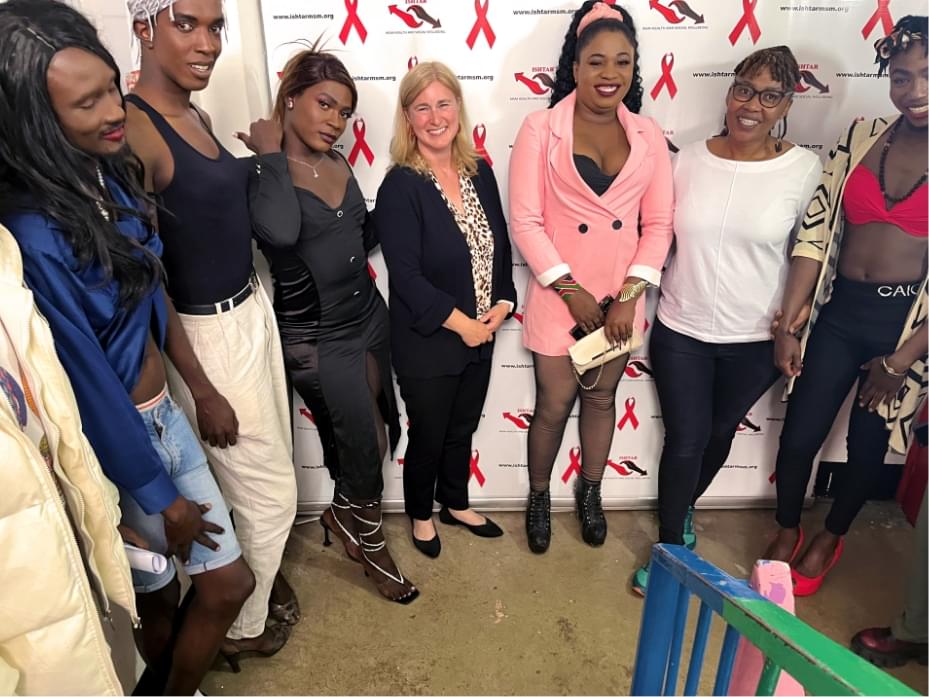
Photo Credit: SLF
Meg enjoyed a performance of the Dolls at Ishtar MSM.
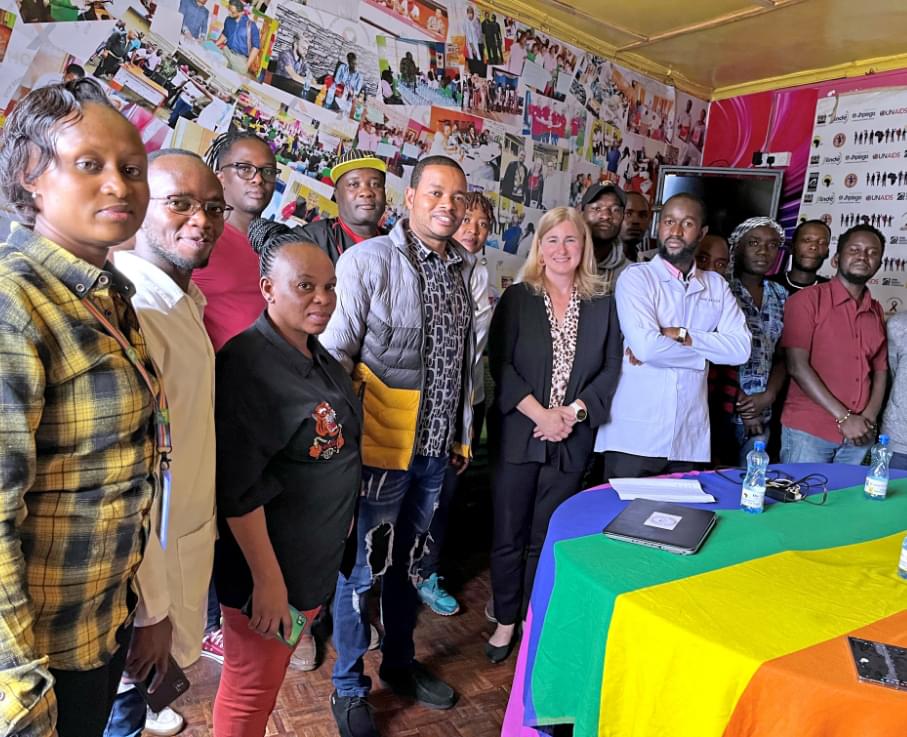
Photo Credit: SLF
Meg visits with staff and clients at HOYMAS.
At Ishtar, the centre was hopping. People were arriving for health services or to find a safe place to socialize with friends. One man was making jewelry, and I bought a lovely, beaded necklace for my daughter. The head of Ishtar had just returned from a meeting with other HIV service providers who were collaborating on their proposal for the Global Fund to Fight AIDS, Tuberculosis and Malaria, to ensure that the needs of key populations, including LGBTIQ communities, would be addressed through the next round of funding coming to Kenya.
It was clear at both HOYMAS and Ishtar that while they provide important health services, the opportunities they create for people to come together and enjoy one another’s company is just as important. My visit to Ishtar culminated in a performance by the Dolls, a group of gay, transgender, and non-binary people who walked the catwalk to the cheers and hollers of support from their friends. In an environment that can be so hostile for Kenyan LGBTIQ communities, the smiles and laughs were a perfect way to end the day and a clear reminder of the power of solidarity.
A long history and new vision
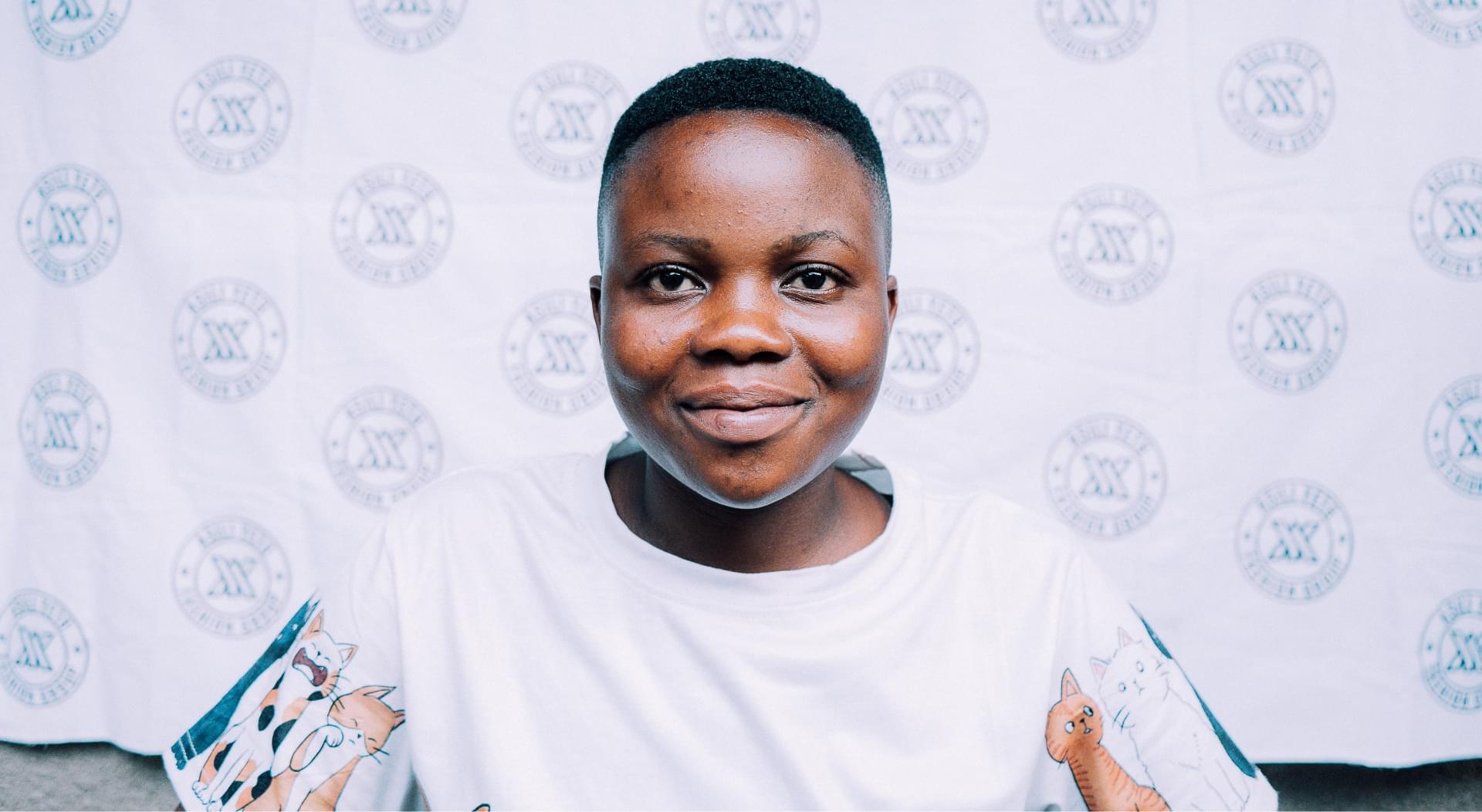
Photo Credit: Neema Ngelime
Location: Tanzania
Upendo Chaurembo found hope and community through PASADA's support.
Home-based care, entrepreneurship training, and youth programming are just some of the many opportunities that Pastoral Activities and Services for People with AIDS (PASADA) provides to communities in Dar es Salaam, Tanzania. The SLF has partnered with PASADA since 2004 and the community-led organization was one of the first to be featured in Grassroots:
“PASADA is a model for providing home-based care, where trained volunteers support very sick patients within their homes. These volunteers are led by teams of professional nurses and counsellors who treat opportunistic infections, help control pain, provide nutritious food, and counsel family members.”
In its early years, SLF support helped coordinate and expand PASADA’s activities by training the home-based care teams, providing transportation for home visits, and upgrading the skills and knowledge of nursing and dispensary workers.
Founded in 1992 by a small group of people living with HIV who were seeking mutual support, PASADA has since expanded to meet its community’s needs and the changing context of HIV and AIDS. Open to everyone without discrimination and free of charge, PASADA’s clients currently exceed 28,000 people living with HIV.
Among them are Upendo Chaurembo, Aisha Omary, and Frank Mncingo, whose stories of triumph we are honoured to share with you.
For Upendo Chaurembo, going to school used to be difficult. She had to travel 15 km each way, which was very tiring. Studying science and managing homework became a challenge. On the brink of giving up, she met PASADA staff members Lucy and Edna. Under their mentorship, she regained hope and found a sense of community within PASADA's women's group.
Since then, Upendo has acquired valuable skills like making batik fabric, soap, and traditional Tanzanian crafts. Selling these items helps her to supplement her family's household income. She also contributes to her community by educating girls about their sexual and reproductive health. She is hopeful that her efforts will help keep more girls in school to complete their education.
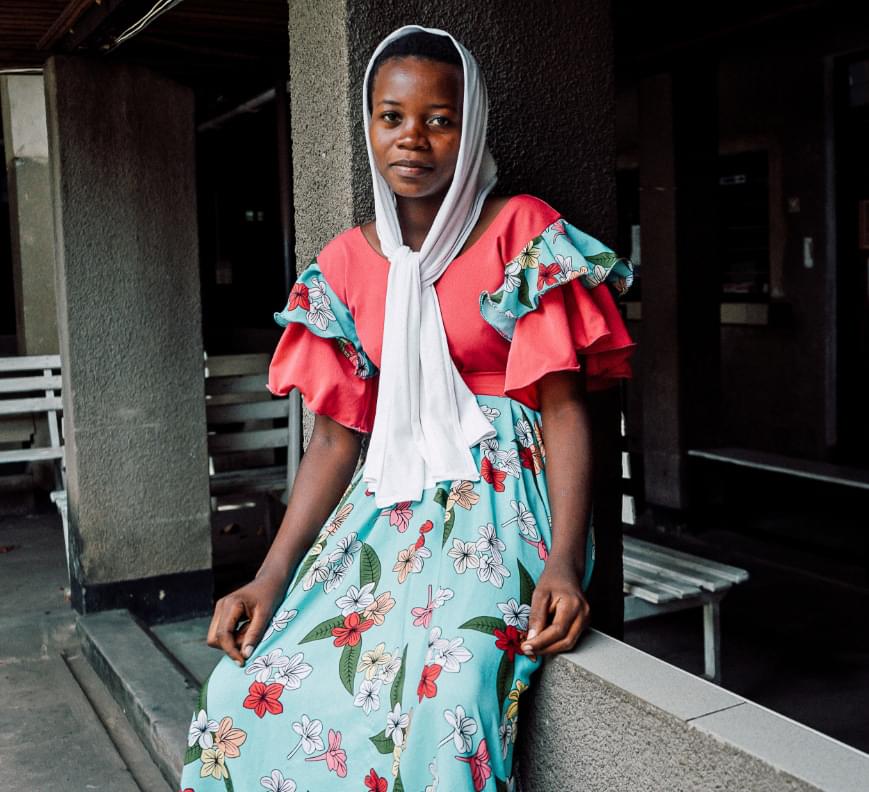
Photo Credit: Neema Ngelime
Location: Tanzania
Aisha Omary, wearing a dress she made.
Aisha Omary is one of four children raised by a widowed mother. She had been unable to continue her education when she was younger and her mother was struggling to support her younger siblings in their education. Aisha’s mother suggested to Aisha that she might want to connect with PASADA. There she became part of a collective and learned to sew. With this new skill, she has significantly increased her family's income. Now she can support her mother by providing pocket money and transportation expenses for her siblings, ensuring they can enjoy their education. Aisha's passion for tailoring is evident, and she believes there are more techniques to explore in the field.
Frank Mncingo is in his early twenties and describes his younger self as having been stubborn and without much respect for his parents. Through the PASADA kids club, which engages with children and provides education support, he received help with his schoolwork and slowly his behaviour began to change.
One popular program activity known to have a positive impact for young people is the Journey of Life exercise. It helps children to better understand their challenges and how they can achieve their goals. Frank shared with us that, with PASADA’s support, he turned his life around and eventually became a student leader at his school. By the end of his school years, he was at the top of the class, passed his exams, and became a youth football coach. Frank is now a peer educator for the PASADA kids club. Frank hopes the program can expand to provide even more support for young people, including nutritious meals.
PASADA has had a profound impact on the communities it serves and is continuing to grow with a new vision. The organization aims to expand its work to more regions that require support and attention. PASADA will also introduce a new focus on environmental health. With its long history of community-led programming, including HIV prevention services and supporting orphaned and vulnerable children, PASADA is bringing immense expertise to these new endeavours.
Support from donors like you allows the SLF to provide long-term flexible funding to organizations like PASADA, which are then able to grow their impact over time and adapt to the changing needs of their communities.
A life and legacy of compassion, justice, and equality
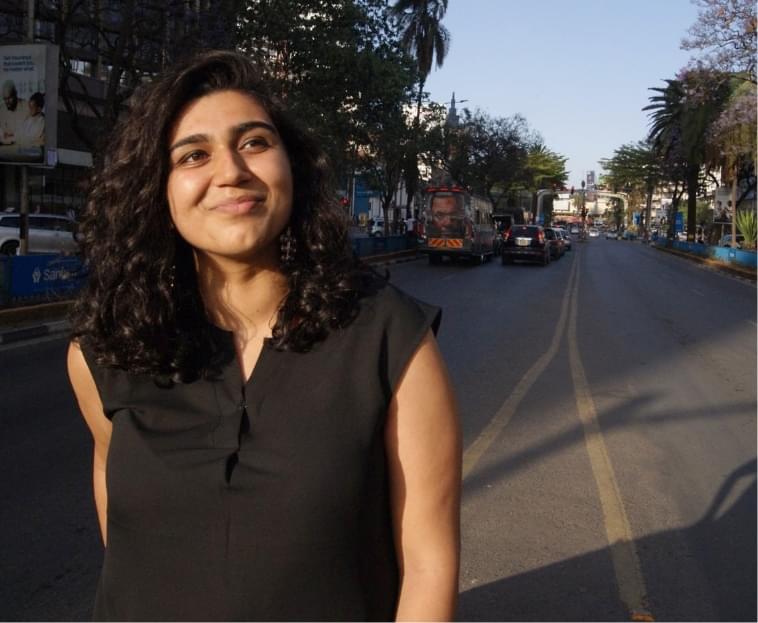
Photo Credit: Nabila Walji Foundation
Nabila Walji, from Alberta, Canada, was only 28 years old when she passed away, but she had already grasped the importance of leaving a legacy. Throughout her life, she was guided by kindness, compassion, and generosity, and she has left an indelible mark on those she met.
Nabila was passionate about equity, social justice, and supporting vulnerable communities. She spent some time working with adolescents and young people at LVCT Health in Kenya, a longstanding SLF partner.
She enjoyed collaborating with her colleagues who provide services for people with disabilities, and they encouraged her to learn Kenyan Sign Language. Nabila shared that learning from and interacting with the team at LVCT Health was the greatest of many highlights of her time there. Her colleague, Phyllis, reflected recently on the impact Nabila had on LVCT.
“Her time serving LVCT Health was marked by her unwavering dedication, creativity, and friendliness. As a passionate storyteller and avid photographer, Nabila played a pivotal role in documenting the experiences and narratives of our programs. Through her lens and pen, she vividly captured the essence of our initiatives, showcasing the impact on the lives of girls, young women, and youths. Her storytelling not only brought their stories to life but also highlighted the importance of our work in empowering and mentoring these girls. Nabila's involvement in community work, particularly in mentoring girls, further exemplified her commitment to fostering growth and development in the lives of those we serve. Her contributions have left a lasting legacy, inspiring us to continue our mission of empowerment through the art of storytelling and mentorship.”
Nabila unexpectedly passed away in 2022. Honouring Nabila, and in line with her values, her family made a legacy gift to LVCT Health in her name. With this remarkably generous gift, LVCT Health is determined to bring about positive change in communities in Kilifi County, Kenya. The funds will help address urgent and vital needs, including nutrition for children enrolled in LVCT Health's HIV programming, and education support for children living with HIV.
As Nabila’s legacy shows, our values are powerful. They shape who we are, and when put into action, our values can also help shape the world. We all have the power to create impact that will resonate for generations.
One of the ways you can show what you care about and value most is by considering a gift in your will. By choosing to leave a legacy gift to the Stephen Lewis Foundation, you are making a powerful statement about the kind of world you envision — one that is compassionate, just, and equitable. The same kind of world envisioned by Nabila Walji and her family.
If you have been inspired by this remarkable young woman’s life, please consider putting your values into action through a gift in your will today. More information on legacy giving is available at theslf.org/legacy.
The quilt is on the move across Canada!
From libraries and city halls to quilt shops and museums, the 20th Anniversary Commemorative Solidarity Quilt is scheduled to visit more than 35 communities across Canada.
Lovingly stitched together by more than 300 grandmothers, the quilt is a powerful symbol of solidarity crafted over four months by 20 grandmothers groups in 10 Canadian communities. We received enough contributions from grandmothers across Canada and six countries in sub-Saharan Africa, that a second quilt was created from the additional material. The smaller quilt, called No One Left Behind, will travel with the Solidarity Quilt.
These remarkable works of art in honour of the Stephen Lewis Foundation’s 20th anniversary are a testament to what is possible when women gather, connect, and share their resources, creativity, and compassion.
Over the next year, as the finished quilts travel across Canada, opportunities to see them will be posted on the Grandmothers to Grandmothers Campaign website.
Follow the quilts’ travels at grandmotherscampaign.org/solidarity-quilt.
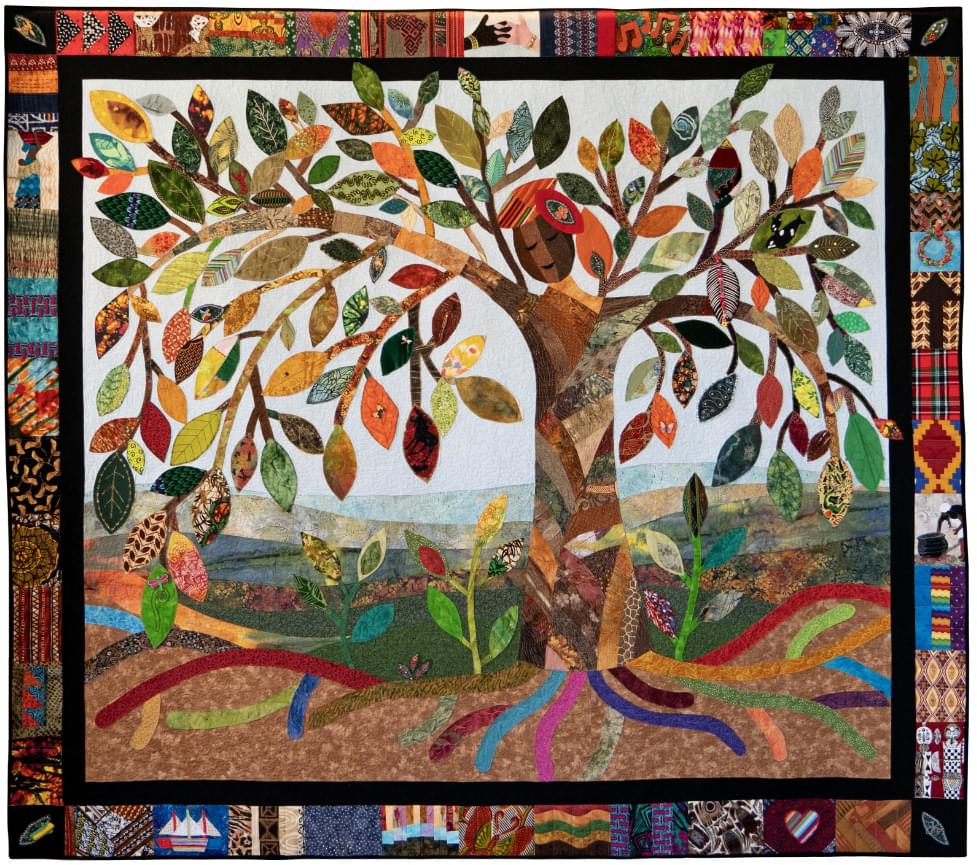
Description: 20th Anniversary Commemorative Solidarity Quilt, 72"W x 60"H
LPK’s vision [for the quilt] is giving life a new hope. We are leaves that were once treaded on by unfavourable weather, diseases, and viruses. However, because we are anchored on a strong tree we are now flourishing, blossoming, and acquiring our former beauty.
— Living Positive Kenya (LPK) Ngong, Kenya
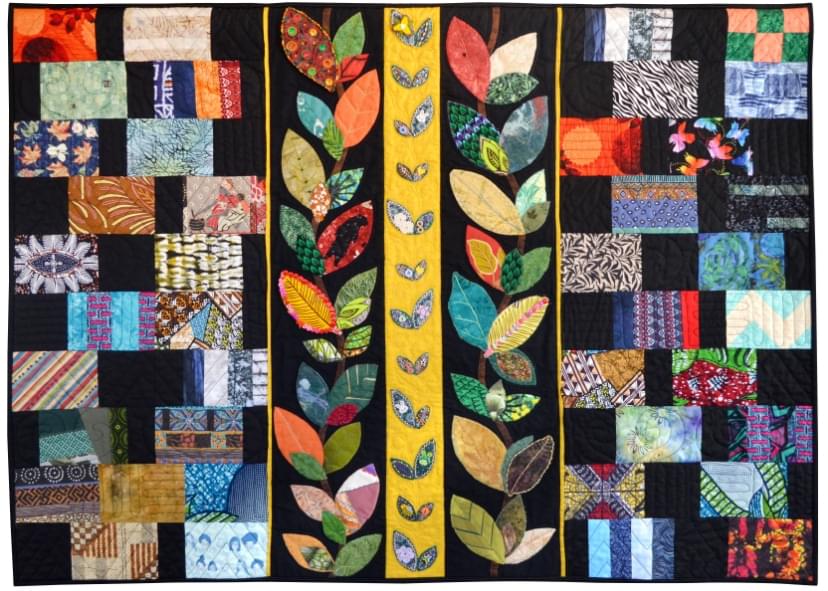
Description: No One Left Behind, 56.5”W x 40”H
I really like the idea and results of this type of collaborative work between the different groups. I think it is giving us an emotional connection that hasn’t been nurtured in this way before. It’s been lovely, and it’s not over yet!
— Yvonne, a member of Ujamaa Grandmas in Calgary, Canada
Stephen Lewis Foundation Financial Overview
From July 2022 to June 2023, the SLF raised $9.3 million in support of 119 organizations working in 15 countries.
Financial Overview 2021-2022
The Foundation’s fiscal year runs from July 1 to June 30. For a copy of the Foundation’s full audited financial statements and the link to our annual Canada Revenue Agency (CRA) charity returns, please visit: stephenlewisfoundation.org/who-we-are/financials.
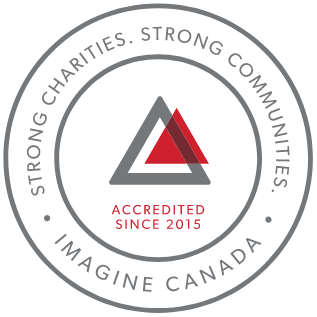
The SLF is proud to be accredited by the Imagine Canada Standards Program. Accredited organizations demonstrate excellence and leadership in five key areas: board governance, financial accountability and transparency, fundraising, staff management, and volunteer involvement.
Consistent funding is at the heart of the SLF
The SLF works in allyship with partners who deliver proven community-led responses to HIV and AIDS. These organizations and their programs are crucial to addressing the barriers people continue to face in accessing education, health care, and social support. They restore hope, reclaim human rights, fight injustice, and save lives.
Monthly contributions have greater impact over time. They allow us to provide sustainable, long-term support to our partners, and to respond quickly in crises.
We’re deeply grateful for your own solidarity with our partners in sub-Saharan Africa. Please consider renewing your commitment with a monthly gift to ensure support for our partners remains strong and sustainable at https://theslf.org/give-monthly.
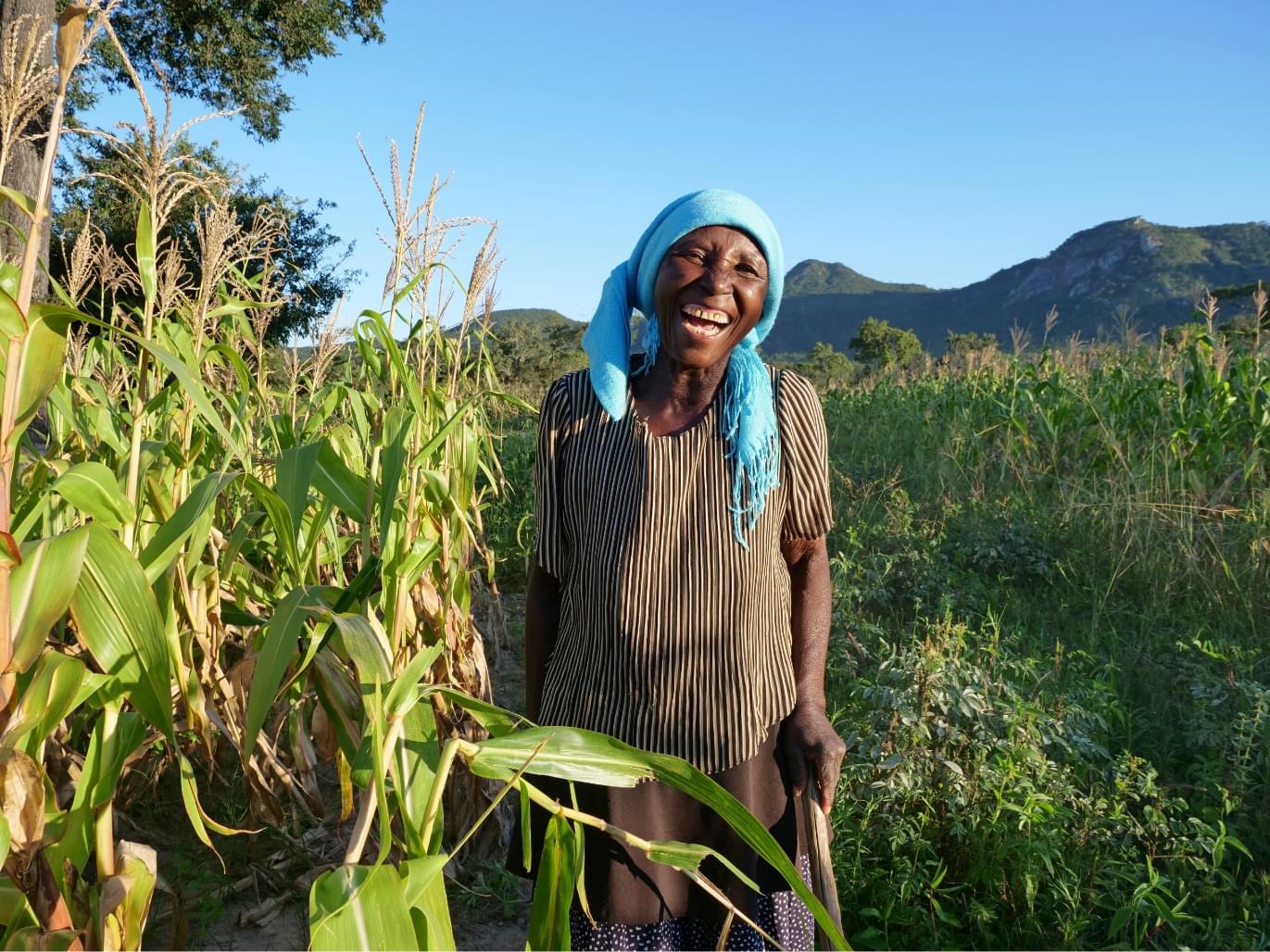
Photo Credit: Eva Gilliam
Location: Zimbabwe
I have always been inspired by Stephen’s compassion and the integrity with which he holds it. I continue to be inspired by how those two qualities permeate your organization and the people with whom you work.
— Robert Hart
Terrace, British Columbia, Canada
Give a Day at 20 years
Since the early days of the SLF, Canadians have embraced projects, hosted events, and engaged in friendly competitions that make the Give a Day Campaign stand apart. Every effort, large or small, modest or wildly ambitious, succeeds in raising funds and awareness to end AIDS. Everyone who supports Give a Day is a champion of health and human rights!
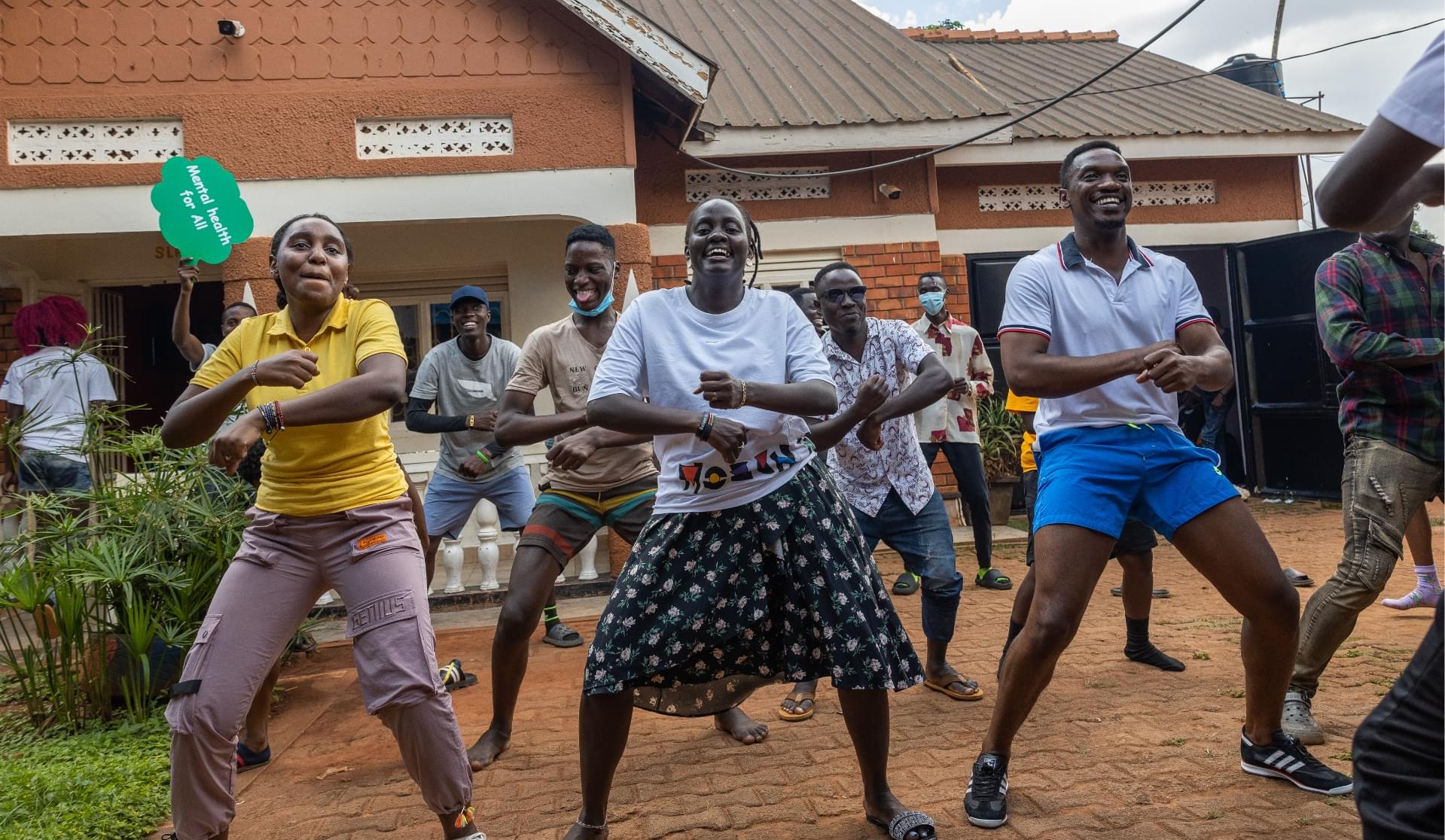
Photo Credit: Sofi Lundin, IBU
Location: Uganda
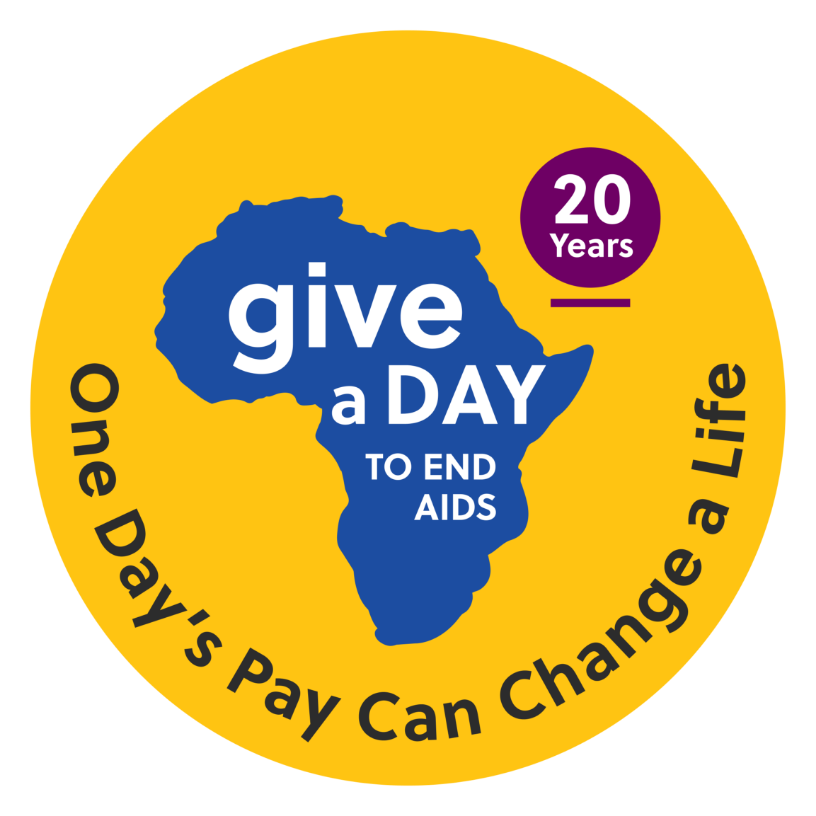
What inspired the Give a Day movement? In 2004, Dr. Jane Philpott challenged her colleagues at Markham Stouffville Hospital to donate one day’s pay on World AIDS Day (December 1) toward the Give a Day Campaign. In her words, “As we worked on December 1, we were not only caring for local patients, but we worked to ease the pain of HIV and AIDS in Africa. Could it be that one year, every Canadian will be giving up one day’s income on World AIDS Day?”
This year marks 20 years of Give a Day — a powerful expression of global solidarity, compassion, and determination. Across Canada, thousands of people just like you are getting involved. They’re joining as individuals and teams and they’re getting their families, friends, colleagues, employers, firms, unions, and networks on board!
Find out how you can join Give a Day and calculate your one day’s pay at theslf.org/giveaday.
It’s time to order your holiday tribute cards
The holiday season is nearly here. With it comes a welcome opportunity to reconnect, share holiday joy, and act in global solidarity. This year, consider making donations and sending beautiful, printed cards or e-cards to your family, friends, and colleagues. Simply donate online and send e-cards for easy and immediate delivery. We can also send you cards to personalize and deliver yourself or mail cards on your behalf. Your contributions will have a meaningful and tangible impact for our grassroots partners and their communities.
